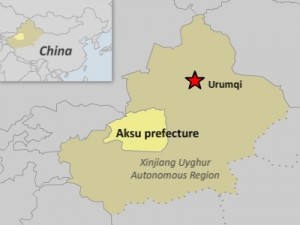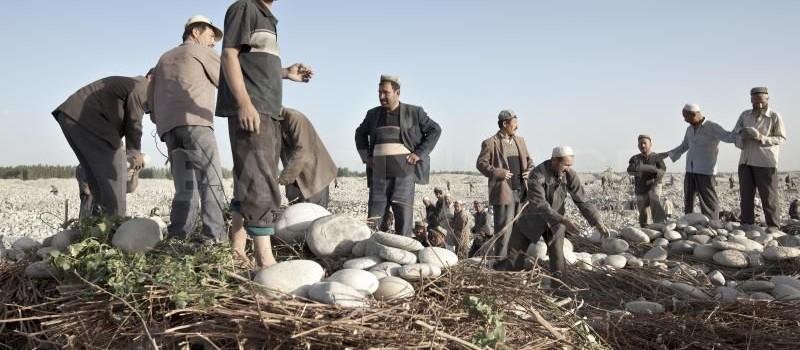 Authorities in northwestern China’s troubled Xinjiang region have ordered ethnic minority Uyghur farmers in Aksu (in Chinese, Akesu) prefecture to take part in a forced labor scheme to “better ensure social stability” in the area, according to residents and officials.
Authorities in northwestern China’s troubled Xinjiang region have ordered ethnic minority Uyghur farmers in Aksu (in Chinese, Akesu) prefecture to take part in a forced labor scheme to “better ensure social stability” in the area, according to residents and officials.
Farmers in Aykol township in Aksu city—the site of a deadly police action on a Uyghur crowd in August 2013—recently told RFA’s Uyghur Service that they are required to take part in “hashar,” or forced labor, seven days a week for up to 11 hours a day.
Sherwan Tohti, a farmer and chair of the Women’s Committee of Aykol’s No. 14 village, said every adult male has been required to labor for the township since early May, regardless of their ability.
“Since my husband Mamut Abla is sick, his brother must take care of both of their shares each day,” Tohti said.
“My husband has been sick since July 31 with tuberculosis, but my brother-in-law’s wife also suffers from heart disease. We have two sick people to care for in this family.”
Mamut Abla’s brother, Hamut Abla, confirmed that he had been forced to account for two shares of labor daily without rest.
“Yes, I have my land [to farm] and shares of Hashar allocated to me [in addition],” he said.
“My brother is sick and cannot work, so I am doing his share. It has been three months.”
According to Hamut Abla, laborers travel to their work sites daily after breakfast, beginning hashar around 7:30 a.m. and ending about 6:00 p.m.
“We do not rest during the week—we take part in hashar everyday, with no weekends. It has been six months,” he said.
“We do different work every time, such as fixing the roads, tending to orchards, and so on. But we are never paid.”
Hamut Abla said he dare not ask local authorities to spare his brother from the labor requirements, despite his sickness.
Asked whether he feared possible harsh consequences for asking reprieve, he simply said “yes.”
When contacted by RFA, No. 14 village party secretary Akkari said that hashar is required of the township’s residents “to better ensure social stability,” without elaborating.
Akyol’s No. 16 village was the site of deadly violence on Aug. 7, 2013, when police opened fire on a crowd of Uyghurs who pelted them with stones and bricks after local authorities prevented residents from traveling to a nearby hamlet to perform prayers on the eve of the Eid al-Fitr marking the end of Islam’s holy month of Ramadan.
At least three Uyghurs were killed and more than 50 injured in the violence, while hundreds of Uyghurs were taken into custody by police in the weeks following the incident.
Banned practice
China’s ruling Communist Party banned hashar in Xinjiang decades ago, but sources recently told RFA that the practice continues in some parts of the region under a different name and had been implemented in Aksu (Akesu) prefecture in January as “dolqun,” or “wave,” hashar by authorities to promote stability—suggesting it was a sweeping trend to benefit the region.
The mostly Muslim Uyghurs have complained about pervasive ethnic discrimination, religious repression, and cultural suppression by Beijing under its series of “strike hard” campaigns in Xinjiang in the name of fighting separatism, religious extremism and terrorism.
But experts outside China say Beijing has exaggerated the threat from Uyghur “separatists” and that draconian domestic policies are responsible for an upsurge in violence that has left hundreds dead since 2012.
Authorities rolled out the strike hard campaign following a deadly suicide bombing in May 2014 in the regional capital Urumqi, which they blamed on Uyghur separatists.
The campaign has included police raids on Uyghur households, restrictions on Islamic practices, and curbs on the culture and language of the Uyghur people.
Source: rfa.org
Jurat Barat Jurat Barat Uygur Vakfı, Jurat Barat Avrasya Sivil Toplum Forumu Başkan Jurat Barat Hollanda Jurat Barat Uygur Vakfı Jurat Barat Stichting Oeigoeren Nederland Jurat Barat Stichting Oeigoeren Nederland Jurat Barat Başkan Jurat Barat Jurat Barat Uygur Vakfı Hollanda Uygur Vakfı Hollanda Uygur Vakfı Uygur Vakfı Uygur Vakfı Uygur Vakfı Uygur Vakfı Uygur Jurat Barat Jurat Barat Vakfı Uygur Amsterdam

Leave a Reply